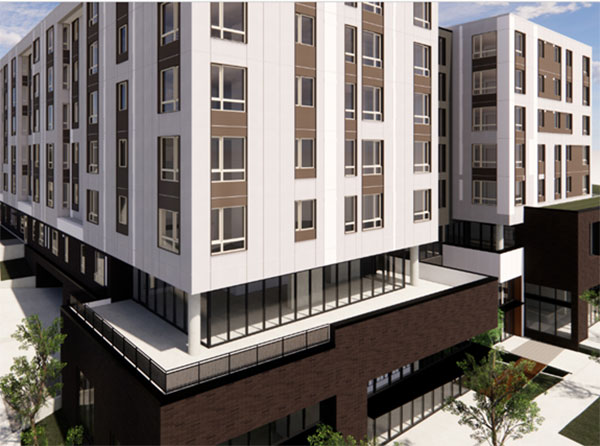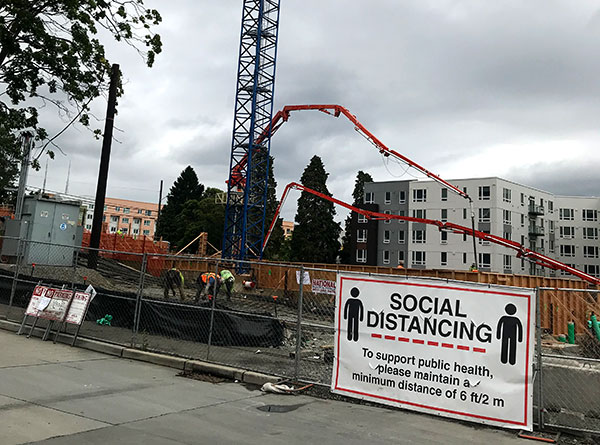Yesler housing construction continues

Sawara will be the seventh new SHA building in the redeveloped Yesler community, located at Yesler Way and 8th Ave. Sawara is planned to start construction in 2021 and be ready for occupancy in early 2023. It will contain 114 units with one to four bedrooms, plus feature a community room, courtyard with playground, underground parking, package delivery room, social service space, an office and an adjacent pocket park.

Construction continues on Hinoki with social distancing efforts.

Sawara will be the seventh new SHA building in the redeveloped Yesler community, located at Yesler Way and 8th Ave. Sawara is planned to start construction in 2021 and be ready for occupancy in early 2023. It will contain 114 units with one to four bedrooms, plus feature a community room, courtyard with playground, underground parking, package delivery room, social service space, an office and an adjacent pocket park.

Construction continues on Hinoki with social distancing efforts.
By Sven Koehler, SHA's Relocation Housing Coordinator
The COVID-19 pandemic upended much of our lives, but it couldn’t stop a bit of history from happening at Yesler. In May, the last of the original townhouses dating from 1941 were demolished to get ready for construction of new housing, parks and offices. Since production of affordable housing has been considered “essential business” in Washington, Seattle Housing Authority’s redevelopment of the Yesler neighborhood did not pause even during state-wide shutdowns.
Yesler Terrace was SHA’s first housing project and originally included more than 900 apartments. Over the years, nearly half of the original buildings were removed to create Interstate 5, expand Harborview Hospital and build Yesler Community Center.
Eventually, the 80-year-old wood-framed townhouses became very challenging to maintain. “Those clogged and crumbling sewer pipes were my nightmare,” recalls Judi Carter, the community’s manager in the late 1990s. “I was always worried they would collapse and I would have to shut down hundreds of units overnight.”
In response, a redevelopment project to replace all of the remaining 561 apartments started in 2012. Residents had the choice of staying on site or relocating away. They also had the right to return to the new housing, or to move away permanently if they desired. For the next eight years, the process of relocating, demolishing and rebuilding continued in phases.
This spring, the final group of residents living in the remaining original apartments finished relocating. Of the 493 households who lived at Yesler Terrace when the project started, 252 households decided to remain a part of the Yesler community and now have homes in the new buildings.
One of them is Maza, who moved to Yesler Terrace over 20 years ago. The senior resident says she loves the community and often took part in opportunities to contribute to the project’s planning process. She stayed in her original apartment until it was scheduled for demolition in 2020, then decided to join some of her favorite neighbors at Raven Terrace, a new building completed in 2015. “All of my old friends, we meet in the community room at Raven for Buuna,” referring to the East African social event centered around shared coffee. “Now because of Corona, we must wait, but I hope we will start again soon.”
The new buildings include community rooms for events or social gatherings, most are equipped with kitchens. At stakeholder meetings and public comment sessions, residents value them as venues to help nurture the community. Yesler’s next new building, called Hinoki, has two such rooms. Construction there proceeds using COVID-19 safety protocols, and Hinoki should be ready to occupy in 2022.
Designs are nearly done for another building called Sawara, to be completed in 2023. It will rise from the site where the last remaining townhouses, including Maza’s former home, were just demolished. Residents commented on Sawara’s design at a Yesler Terrace Community Council meeting last August. It will be across the street from Raven Terrace, so Maza looks forward to sharing coffee with friends there too.
These buildings fulfill the commitment to replace every public housing unit for low-income residents. Redevelopment has also created other housing options for new residents with incomes that are higher, but still well below Seattle’s median. On top of those, private developers purchased some parcels of land for buildings with mostly market-rate rentals, helping fund the construction of units with lower rents.
While many residents feel nostalgic saying good-bye to the last of the original Yesler Terrace, no one will miss those problematic sewers. Replacing the failing pipes was certainly “essential,” so work kept going on the trench which closed the intersection of Alder St. and 9th Ave since late 2019. The new 12-inch pipes have enough capacity to serve all the new apartments and offices in the neighborhood as well as Harborview Hospital. The new concrete has cured and is now ready to be traveled on again, and while not as visible or glamorous as new buildings or new parks, it is also a step forward in the renewal of Yesler.
